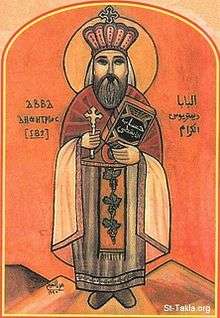Pope Demetrius I of Alexandria
| Saint Demetrius of Alexandria | |
|---|---|
| 12th Pope of Alexandria & Patriarch of the See of St. Mark | |
 Pope Demetrius of Alexandria | |
| Papacy began | 4 March 189 |
| Papacy ended | 22 October 232 |
| Predecessor | Julian |
| Successor | Heraclas |
| Personal details | |
| Born | Alexandria, Egypt |
| Died |
22 October 232 Alexandria, Egypt |
| Buried | Baucalis, Alexandria |
| Nationality |
|
| Denomination | Orthodox Christian |
| Residence | Saint Mark's Church |
| Sainthood | |
| Feast day | 22 October |
Pope Demetrius I of Alexandria (died 22 October 232), 12th Pope of Alexandria & Patriarch of the See of St. Mark. Sextus Julius Africanus, who visited Alexandria in the time of Demetrius, places his accession as eleventh bishop after Mark in the tenth year of Roman Emperor Commodus; Eusebius of Caesarea's statement that it was in the tenth of Septimius Severus[1] is a mistake.
Life
Demetrius was a farmer, and lived with his wife as brother and sister for 47 years until he was chosen a Patriarch.[2] According to the Synaxarium, a historical collection of the Church’s saints, the ailing Pope Julian had a vision in which he was told that his successor would visit him the next day with a cluster of grapes, which were out of season at that time of year. The next day, a farmer named Demetrius found grapes and went to the Pope for his blessing, and shortly after became Pope Demetrius I, the twelfth bishop of Alexandria.
Pope Demetrius took interest in establishing a fixed basis for fasts and Christian holy days. He established the reckoning by which the dates of fasting were determined.[2] A scholar in his own right, Demetrius took part in the controversy over the proper calculation of Easter. He was the first to devise the calculation for fixing the dates to celebrate Easter each year. His calculation was approved by the Nicean Ecumenical Council (325 AD). Today many of the Eastern Orthodox churches continue to use his calculation.[3]
While Jerome claimed that Demetrius sent Pantaenus on a mission to India,[4] it is likely that Clement had succeeded Pantaenus as the head of the Catechetical School before the accession of Demetrius. When Clement retired (c. 203), Demetrius appointed Origen, who was in his eighteenth year, as Clement's successor.[5]
Demetrius gave Origen encouragement at the beginning of his career, and is said to have shown him favor. He dispatched Origen to the governor of Arabia, who had requested his presence in letters to the prefect of Egypt as well as to Demetrius. When the Emperor Caracalla sacked Alexandria (215) in punishment for their satire directed at him, Origen fled to Caesarea, where the bishops present requested that he give sermons. Demetrius wrote to him a rebuke that this activity was not fitting for a layman. Bishops Alexander of Jerusalem and Theoctistus of Caesarea wrote in his defense and mentioned precedents for laymen to give sermons, but despite their efforts Demetrius recalled Origen. [6]
In 230, Origen was asked to settle a dispute in Achaea which required his presence, so he set out by way of Palestine. Origen was ordained priest at Caesarea without leave.[7] When Demetrius learned of this, he considered it an act of insubordination, which ended their relationship. Demetrius convened a synod in 232 that banished Origen, then sent a formal condemnation of Origen to all the churches. It is impossible to doubt that heresy, and not merely unauthorized ordination, must have been alleged by Demetrius for such a course.[6] Rome accepted the decision, but Palestine, Phoenicia, Arabia, Achaea rejected it. From Caesarea Origen sent forth letters in his own defence, and attacked Demetrius.
Demetrius put the Catechetical School under the charge of Heraclas, the first pupil of Origen, who had long been his assistant. This may have been Demetrius' final act as bishop. Demetrius governed the Church of Alexandria for forty-two years,[8] and died at the age of 105.[9]
Notes
- ↑ Historia Ecclesiastica, VI, 2
- 1 2 "The Departure of Abba Demetrius I, 12th Pope of Alexandria", Coptic Orthodox Church Network
- ↑ "Our Coptic Heritage", St. Mark's Coptic Orthodox Church, London
- ↑
 "De Viris Illustribus - Pantaenus the Philosopher".
"De Viris Illustribus - Pantaenus the Philosopher". - ↑ "The School of Alexandria", The Coptic Orthodox Church Centre UK
- 1 2 Chapman, John. "St. Demetrius." The Catholic Encyclopedia. Vol. 4. New York: Robert Appleton Company, 1908. 9 Mar. 2014
- ↑ Eusebius, Historia Ecclesiastica VI, 23.
- ↑ Woods, Joseph. "The Church of Alexandria." The Catholic Encyclopedia. Vol. 1. New York: Robert Appleton Company, 1907. 17 Jan. 2014
- ↑ "Departure of Abba Demetrius", Mission St. Clare
References
- "Dimitrios (189–232)". Official web site of the Greek Orthodox Patriarchate of Alexandria and All Africa. Retrieved 2011-02-08.
| Titles of the Great Christian Church | ||
|---|---|---|
| Preceded by Julian |
Pope and Patriarch of Alexandria 189–232 |
Succeeded by Heraclas |
| |||||||||||||||||||||||||||||||||||||||||||||||||||||||||
|
